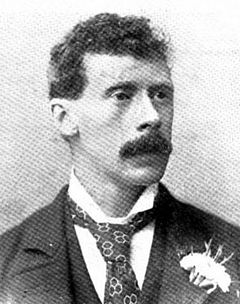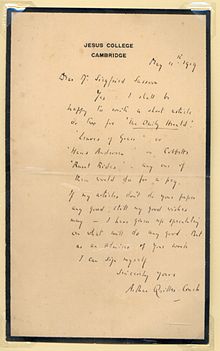- Arthur Quiller-Couch
-
Sir Arthur Quiller-Couch 
Born 21 November 1863
Bodmin, Cornwall, United KingdomDied 12 May 1944 (aged 80) Pen name Q Occupation Poet, novelist, critic Nationality British Education Newton Abbot College
Clifton CollegeAlma mater Trinity College, Oxford Notable work(s) Oxford Book of English Verse, 1250–1900 Notable award(s) Knight Bachelor (1910)
Bard of Gorseth Kernow (1928)
InfluencedSir Arthur Thomas Quiller-Couch (
 /ˌkwɪlərˈkuːtʃ/; 21 November 1863 – 12 May 1944) was a Cornish writer, who published under the pen name of Q. He is primarily remembered for the monumental Oxford Book Of English Verse 1250–1900 (later extended to 1918), and for his literary criticism. He guided the taste of many who never met him, including American writer Helene Hanff, author of 84, Charing Cross Road and its sequel, Q's Legacy; and the fictional Horace Rumpole via John Mortimer, his literary amanuensis.
/ˌkwɪlərˈkuːtʃ/; 21 November 1863 – 12 May 1944) was a Cornish writer, who published under the pen name of Q. He is primarily remembered for the monumental Oxford Book Of English Verse 1250–1900 (later extended to 1918), and for his literary criticism. He guided the taste of many who never met him, including American writer Helene Hanff, author of 84, Charing Cross Road and its sequel, Q's Legacy; and the fictional Horace Rumpole via John Mortimer, his literary amanuensis.Contents
Life
Quiller-Couch was born at Bodmin in Cornwall to the union of two ancient local families, the Quiller family and the Couch family,[1] and was the third in line of intellectuals from the Couch family. His younger sisters Florence Mabel and Lilian M. were also writers and folklorists.[2] His father, Dr. Thomas Quiller Couch (d. 1884), was a noted physician, folklorist and historian.[3] His grandfather, Jonathan Couch, was an eminent naturalist, also a physician, historian, classicist, apothecary, and illustrator (particularly of fishes) in the style of the time. His son, Bevil Brian Quiller-Couch, was a war hero and poet, whose romantic letters to his fiancée, the poet May Wedderburn Cannan, were published in Tears of War. He also had a daughter, Foy Felicia, to whom Kenneth Grahame inscribed a first edition of his The Wind in the Willows attributing Quiller-Couch as the inspiration for the character Ratty, auctioned by Bonhams on Tuesday 23 March 2010 for £32,400.[4]
He was educated at Newton Abbot Preparatory College, at Clifton College, and Trinity College, Oxford and later became a lecturer there. On taking his degree in 1886 he was for a short time classical lecturer at Trinity. After some journalistic experience in London, mainly as a contributor to the Speaker, in 1891 he settled at Fowey in Cornwall.
In Cornwall he was an active worker in politics for the Liberal Party. He was knighted in 1910, and in 1928 was made a Bard of Gorseth Kernow, taking the Bardic name Marghak Cough ('Red Knight'). He was Commodore of the Royal Fowey Yacht Club from 1911 until his death.
Literary and academic career
 A handwritten letter from Quiller-Couch to Siegfried Sassoon, about the possibility of Quiller-Couch writing for The Daily Herald.
A handwritten letter from Quiller-Couch to Siegfried Sassoon, about the possibility of Quiller-Couch writing for The Daily Herald.
In 1887, while he was at Oxford, he published Dead Man's Rock, a romance in the vein of Robert Louis Stevenson's Treasure Island, and he followed this up with Troy Town (1888) and The Splendid Spur (1889). Quiller-Couch is well known for his story "The Rollcall of the Reef", based on the wreck of the HMS Primrose in 1807. He published in 1896 a series of critical articles, Adventures in Criticism, and in 1898 he completed Robert Louis Stevenson’s unfinished novel, St. Ives.
From his Oxford days he was known as a writer of excellent verse. With the exception of the parodies entitled Green Bays (1893), his poetical work is contained in Poems and Ballads (1896). In 1895 he published an anthology from the 16th- and 17th-century English lyricists, The Golden Pomp, followed in 1900 by the Oxford Book of English Verse, 1250–1900 (1900).[5] Later editions of this extended the period covered up to 1918 and it remained the leading general anthology of English verse[citation needed] until Helen Gardner's New Oxford Book of English Verse appeared in 1972.
In 1910 he published The Sleeping Beauty and other Fairy Tales from the Old French. He was the author of a number of popular novels with Cornish settings (collected edition as 'Tales and Romances', 30 vols. 1928–29).
He was appointed to the King Edward VII Professorship of English Literature at the University of Cambridge in 1912, and retained it for the rest of his life. Simultaneously he was elected to a Fellowship of Jesus College, which he held until his death. His inaugural lectures as the professor of English literature were turned into the book On the Art of Writing. His rooms were on C staircase, First Court, and known as the 'Q-bicle'. He oversaw the beginnings of the English Faculty there—an academic diplomat in a fractious community. He is sometimes regarded as the epitome of the school of English literary criticism later overthrown by F. R. Leavis.[6]
Alistair Cooke was a notable student of Quiller-Couch and Nick Clarke's semi-official biography of Cooke features Quiller-Couch prominently, noting that he was regarded by the Cambridge Establishment as "rather eccentric" even by the University's standards.
Quiller-Couch was a noted literary critic, publishing editions of some of Shakespeare's plays (in the New Shakespeare, published by Cambridge University Press, with Dover Wilson) and several critical works, including Studies in Literature (1918) and On the Art of Reading (1920). He edited a successor to his verse anthology: Oxford Book of English Prose which was published in 1923. He left his autobiography, Memories and Opinions, unfinished; it was nevertheless published in 1945.
Legacy
His Book of English Verse is oft-quoted by John Mortimer's fictional character Horace Rumpole.
Castle Dor, a retelling of the Tristan and Iseult myth in modern circumstances, was left unfinished at Quiller-Couch's death and was completed many years later by Daphne du Maurier. As she wrote in the Sunday Telegraph on April 1962, she took up the job with considerable trepidation, at the request of Quiller-Couch's daughter and "in memory of happy evenings long ago when 'Q' was host at Sunday supper".[7]
He features as a main character, played by Leo McKern, in the 1992 BBC television feature The Last Romantics.[8] The story focuses on his relationship with his protégé, F. R. Leavis and the students.
His Cambridge inaugural lecture series, published as On the Art of Writing, is the source of the popular writers' adage "murder your darlings".[9]
Works
Fiction
- Dead Man's Rock (1887)
- Troy Town (1888)
- The Splendid Spur (1889)
- The Blue Pavilions (1891)
- St Ives (1898), completing an unfinished novel by Robert Louis Stevenson
- The Ship of Stars (1899)
- Hetty Wesley (1903)
- The Adventures of Harry Revel (1903)
- Fort Amity (1904)
- The Shining Ferry (1905)
- Sir John Constantine (1906)
A collected edition of Q's fiction appeared as 'Tales and Romances (30 volumes, 1928–29)
Verse
- Green Bays (1893)
- Poems and Ballads (1896)
Criticism and anthologies
- Adventures in Criticism (1896)
- The Golden Pomp, (1895)
- Oxford Book of English Verse, 1250–1900 (1900)
- The Sleeping Beauty and other Fairy Tales from the Old French (1910)
- The Oxford Book of Ballads (1911)
- Studies in Literature (1918)
- On the Art of Reading (1920)
- On the Art of Writing (1916)
- Oxford Book of English Prose (1923)
Autobiography
- Memories and Opinions (unfinished, published 1945)
References
- ^ See The QUILLER family of Polperro and The COUCH family of Polperro. Polperro Family History. Retrieved 20 October 2011.
- ^ The Age
- ^ The Gentleman's Magazine
- ^ Flood, Alison (24 March 2010). "First edition of The Wind in the Willows sells for £32,400". guardian.co.uk. http://www.guardian.co.uk/books/2010/mar/24/wind-in-the-willows-bonhams. Retrieved 25 March 2010.
- ^ Of the original edition nearly half a million copies were issued, according to the introduction to the NOBEV, 1972. The extended edition appeared in 1939.
- ^ Eagleton, Terry (1983). Literary Theory. Oxford: Basil Blackwell. ISBN 0 631 132597.; p. 30. Eagleton contrasts the "patrician dilettantes" and "devotees of Sir Arthur Quiller Couch" [sic, no hyphen], with the "offspring of the provincial bourgeoisie" ... "entering the traditional universities for the first time". The Leavisites, says Eagleton, had not "suffered the crippling disadvantages of a purely literary education of the Quiller Couch kind".
- ^ Sunday Telegraph article published as introduction to the 1979 edition
- ^ http://www.imdb.com/title/tt0102276/
- ^ On the Art of Writing, Chapter 12, Paragraph 6
Sources
- Brittain, Frederick, Arthur Quiller-Couch, a Biographical Study of Q (Cambridge: University Press, 1947)
- Quiller-Couch, A. T., Memories and Opinions (Unfinished; it was nevertheless published in 1945 though only the years up to 1887 are covered.)
- Rowse, A. L., Quiller-Couch: a Portrait of "Q" (1988)
Further reading
- Archer, William Poets of the Younger Generation (New York, 1902)
- Joshi, S. T., 'A brief essay on Quiller-Couch's ghost stories', in S. T. Joshi (ed.), The Evolution of the Weird Tale (2004)
- Quiller-Couch, A. T., Quiller-Couch's lectures on the art of writing
External links
- On the Art of Writing
- Works by Arthur Thomas Quiller-Couch at Project Gutenberg
- Arthur Quiller-Couch at the Internet Speculative Fiction Database
- The Warwickshire Avon by Sir Arthur Quiller-Couch (Harper's Magazine)
- Archival material relating to Arthur Quiller-Couch listed at the UK National Register of Archives
 This article incorporates text from a publication now in the public domain: Chisholm, Hugh, ed (1911). Encyclopædia Britannica (11th ed.). Cambridge University Press.
This article incorporates text from a publication now in the public domain: Chisholm, Hugh, ed (1911). Encyclopædia Britannica (11th ed.). Cambridge University Press.- 'Quiller-Couch Family Papers' at the Beinecke Rare Book and Manuscript Library, Yale University.
- 'Quiller-Couch', dedicated website
Categories:- 1863 births
- 1944 deaths
- Fellows of Jesus College, Cambridge
- Alumni of Trinity College, Oxford
- Anthologists
- Bards of the Cornish Gorseth
- Knights Bachelor
- British literary critics
- People from Bodmin
- Old Cliftonians
- Cornish writers
- Cornish novelists
- Cornish poets
Wikimedia Foundation. 2010.
